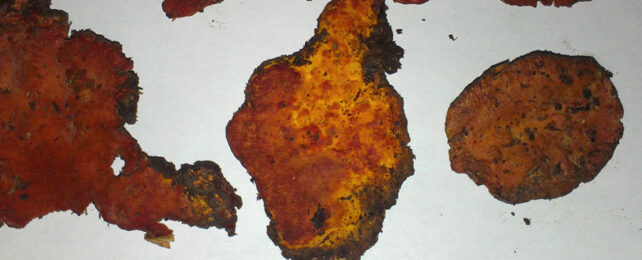The rare Antrodia cinnamomea fungus (also known as Taiwanofungus camphoratus) is only found in Taiwan, and is associated with one particular type of endangered tree. Long used for herbal medicines, the fungus has now been linked to cancer-fighting capabilities through a specific kind of sugar molecule.
Researchers from the National Taiwan University and National Yang Ming Chiao Tung University in Taiwan discovered the link by focusing on a group of compounds produced by the fungus called sulfate polysaccharides (SPS).
SPS is a kind of sugar molecule known as a sulfated galactoglucan, which combines compounds of glucose, galactose, and sulfate into one molecule.
Related: Elusive LSD Fungus Finally Discovered on Flower
Both the fungus and this class of molecule have previously been found to have anti- cancer and anti-inflammatory effects, but the exact mechanisms aren't yet fully understood.
A. cinnamomea can be grown in the lab, making its collection from the field unnecessary. To determine whether A. cinnamomea's bioactive properties were the result of this one group of sugars, however, the researchers were forced to develop technology to encourage the fungus to produce SPS molecules in greater amounts.
A particularly beneficial type of compound was identified: N50 F2. In experiments, it reduced key markers of inflammation in cells, as well as blocking and killing off lung cancer cells.
Of course, these findings need to be verified in living people and not just cultured cells, but the findings show promise for developing new therapies.
"The current study shows that A. cinnamomea SPS has a strong anti-inflammatory effect and inhibits cancer cells in vitro," write the researchers in their published paper.

The discovery demonstrates the value in looking to the natural environment for sources of potential new cancer treatments. Studies have shown that plants, tardigrades, and scorpion venom can help tackle the disease, whether it's by attacking the cancer cells directly, stopping them from spreading, or enhancing existing treatments.
Now we can firmly add A. cinnamomea to the growing list. There's still a lot of work to get this from the lab into actual usable treatments that can be safely prescribed, but the researchers succeeded in their aim of identifying molecules in this rare fungus that can make a difference.
"Our study demonstrates the potential of natural fungal compounds for pharmaceutical development," says pharmaceutical scientist Chia-Chuan Chang, from the National Taiwan University.
"With a fully controlled production and extraction process, we are optimistic about future applications in both health supplements and clinical treatments."
The research has been published in Carbohydrate Polymers.
